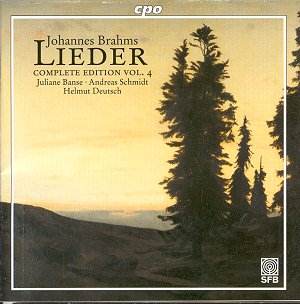 |
Johannes BRAHMS (1833-1897) Crotchet
AmazonUK
AmazonUS |
There are two alternative ways of recording songs: having mixed selections chosen by the artists, as in a recital, or in groupings for publication as made by the composer. In their complete survey of the Brahms songs, CPO have chosen the latter route, which is too rarely found. It certainly helps the collector to know what is going on, and it helps also as far as searching out reference material is concerned. Not that the latter is so important as far is this issue is concerned, since CPO have provided lengthy introductory essays on the music, and there are full texts and translations, nicely laid out, and using paper thick enough to be able to read just one side at a time.
If the packaging is above average, so too are the performances. Both artists clearly know and love the songs they perform. The majority are song by the baritone, Andreas Schmidt, who is on excellent form. The recording engineers have also captured him and his accompanist, Helmut Deutsch, in an ambient and truthful perspective, with results that are most compelling. One highlight among many is the beautifully shaded rendition of Herbstgefühl (Autumn Thoughts), the last song of Opus 48, with those favourite Brahmsian images of the transience of life and the imminence of death.
The soprano voice of Juliane Banse fares rather less well. She certainly sings her songs with conviction and commitment, and with no little artistry. But she is recorded closer than Schmidt, with the result that in climactic passages her tone becomes altogether too strident for comfort. There is clarity, to be sure, but her voice can surely sound more beautiful than it does here.
Grouping the songs in four chronological sets is actually very convincing as an artistic experience, since there is a real ebb and flow of tension and relaxation, as though Brahms had always intended this combination in sequence (which of course he did not). With the one misgiving concerning the over-close recording of the soprano, this CD can be judged a success and makes a useful edition to the Brahms catalogue.
Terry Barfoot